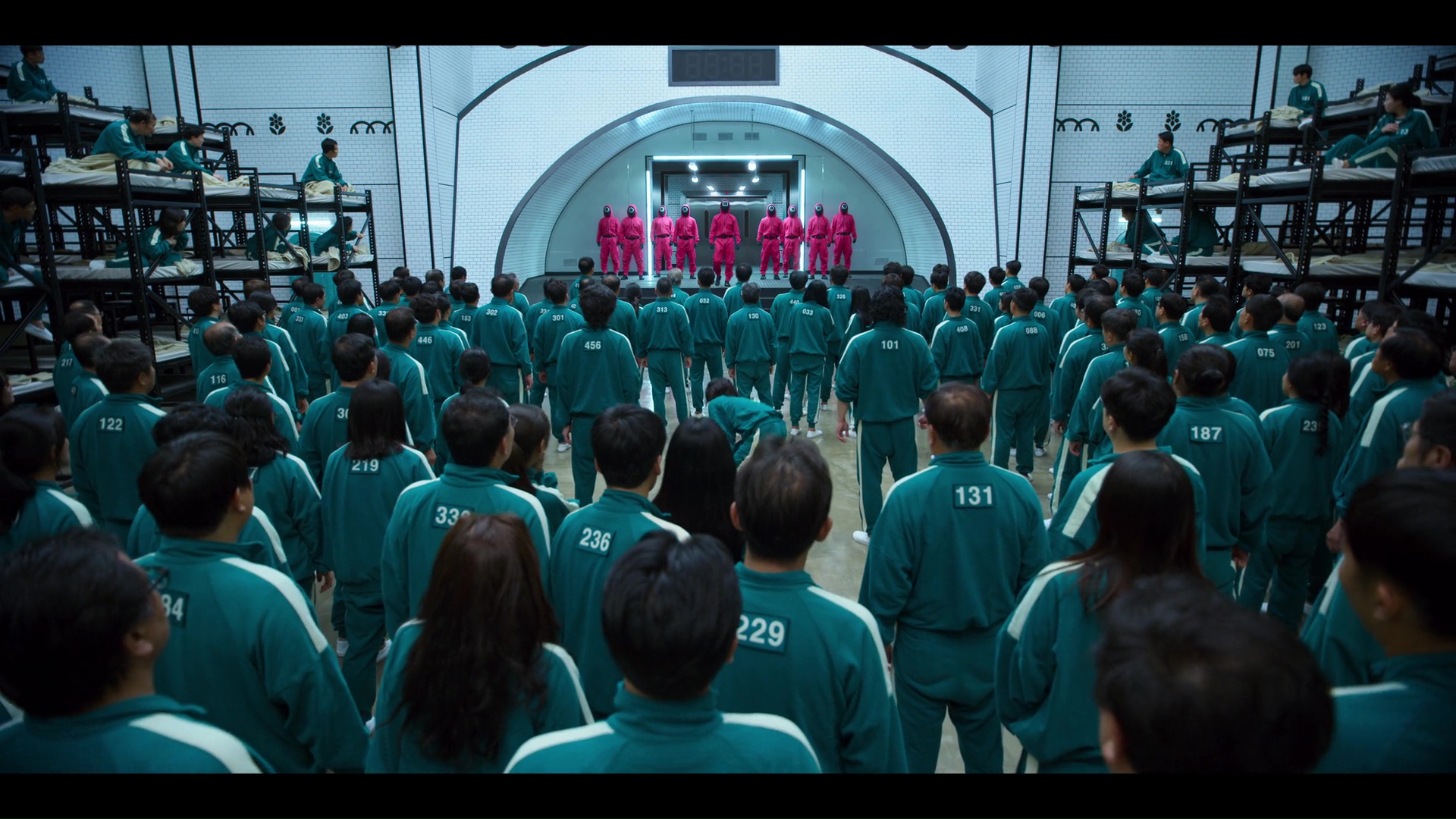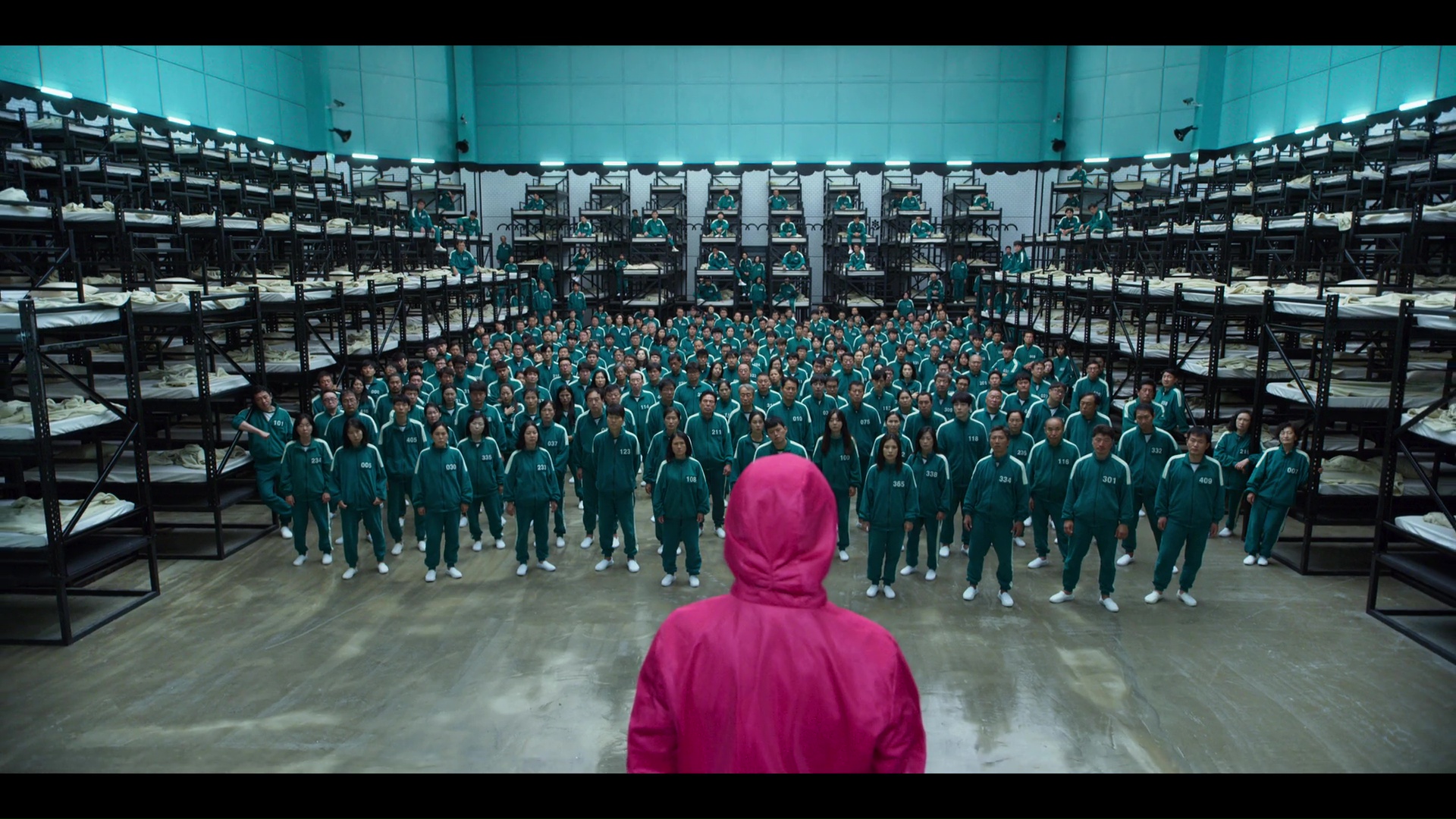
TYPE OF REVIEW ![]() : GOOD OL’ REVIEW
: GOOD OL’ REVIEW
No spoilers.

Netflix has been on a roll ever since they began pouring money into Korean drama production. And its latest is another refreshingly bold entry. Squid Game (오징어 게임) is a flashy (and bloody) series that takes on familiar themes and sets them against the backdrop of a jarring and unsettling game of life and death. Though the series is not short on talent and style (and blood), the series misses an opportunity to go a bit deeper and truly allow it to be something more profoundly affecting.
Squid Game sees a mysterious organization invite hundreds of debt-ridden and downtrodden people to participate in a six-day series of games with a 45+ billion won jackpot waiting at the end. But the players get more than they bargained for when they are seemingly trapped like prisoners. And being eliminated after each round of seemingly innocuous children’s games turns out to be quite literal.
At the heart of the series (and the players we will follow across the nine episodes) include gambling addict Seong Gi Hun (Lee Jung Jae) who cares for his elderly mother and hopes to gain custody of his daughter, investment manager Cho Sang Woo (Park Hae Soo), an elderly man Oh Il Nam (Oh Young Soo) suffering from a brain tumor, North Korean defector Kang Se Byeok (Jung Ho Yeon) looking to pay for a broker that facilitated the escape of her and her younger brother, Pakistani foreign worker Abdul Ali (Tripathi Anupam) hoping to provide for his family, gangster Jang Deok Su (Heo Sung Tae) and a no-nonsense single mother Han Mi Nyeo (Kim Joo Ryoung).
This diverse group of individuals, just some amidst 456 players, either band together or become fierce rivals at first. But the shocking and brutal dynamics of the games change those relationships and connections on a dime.
Meanwhile, detective Hwang Jun Ho (Wi Ha Joon) manages to sneak into the mysterious, highly guarded and vast competition complex in an effort to find answers about his missing brother who himself may have taken part in the games years prior.

Squid Game touches upon familiar themes such as the harsh realities of every day life. Sometimes facilitated by the corruption of money and power which in turns fuels greed and desperation. Each of the 456 players of the game are invited, but aren’t initially forced to join. Once they do, however, they must see the game to its (or their) end. And they accept the invitation because they are at points in their lives where they might feel hopeless and lost. Especially with their own unique situations that vary wildly from sad misfortune to deserved consequence.
The players are left stunned after the first horrific game. But it’s that feeling of “What have I got to lose?” that pushes many to continue on in spite of the life-threatening risks they will face, not only during the six rounds of games, but increasingly at all hours of the day.
Aside from the familiar themes, the set-up is also familiar. Squid Game is most definitely inspired by (or at least shares many similarities to) familiar titles like The Most Dangerous Game or The Hunger Games as well as contemporary stories including fellow Netflix series Alice in Borderland and cult classic Japanese films Battle Royale and As the Gods Will.
That has been used as a critique ahead of its premiere. But Squid Game takes what might be a familiar foundation and makes it distinctly Korean. Much of the philosophy behind the overall story and premise draws upon Korean society and culture. From the struggles and pressures of the often harsh realities of daily life to the beliefs and principles that Koreans may or may not adhere to; those are what makes Squid Game feel very familiar as a Korean drama.
But it’s the stunningly lurid and admittedly gory visuals and the unflinching depravity that emerges both emotionally and physically that sets it apart from anything you typically see on linear Korean television.
Those striking visuals (cheerful bright colors contrasting with the horrific circumstances set in some spectacular sets) and the incredible A-list cast are enough to justify a watch for Squid Game. But as enjoyable as it is, it still falls short in a few important areas.
Though the series has an excellent and intriguing foundation that serves as the jumping off point for the premise as a whole and the motivations of each of the characters, it tends to focus more on the gory spectacle rather than diving deeper. Whether it’s the societal ills that hover over the entire experience or, more importantly, the growth and development of our main characters, the series doesn’t quite deliver the deserved amount of depth each deserves.
The characters, especially, are each so captivating. Thanks in large part to the incredible cast. And we do get glimpses of the fascinating dynamics between them. However, the greater focus on the shock and awe of the games themselves often gives the series the aura of mere plot-driven pulpy narrative, rather than a character-driven story. And these characters are just ripe for such storytelling.
The series can be a bit predictable. Which is fine. But to make up for any lack of genuine surprises (and there are a few), a greater emphasis on the characters would have been welcome. And that would have gone a long way in helping to push the series to greater heights. Heights that, with the foundation it has, should be easily reached.
A notable arrival towards the end of the series is probably the most egregious offender of taking time and focus away from the characters (and the actors that bring them to life) that we have grown to care about and connect with. A plot point that is either unnecessary or poorly executed.

Nevertheless, Squid Game is still a true television event. It won’t be for every one. And some viewers used to non-Netflix-produced series may be shocked and disappointed by its storytelling results. But Squid Game‘s stellar cast, intriguing, yet familiar themes and striking visuals make watching it truly a bloody good time.
Share:
Related posts ..
2 thoughts on “Good Ol’ Review: Though It Doesn’t Quite Reach the Heights It’s Capable Of, Netflix’s “Squid Game” Still a Bloody Good Time”
Share your thoughts!Cancel reply
This site uses Akismet to reduce spam. Learn how your comment data is processed.

It was good, but kind of overrated thanks to the locals. I kinda want to gatekeep Korean drama lololololol
Same tbh